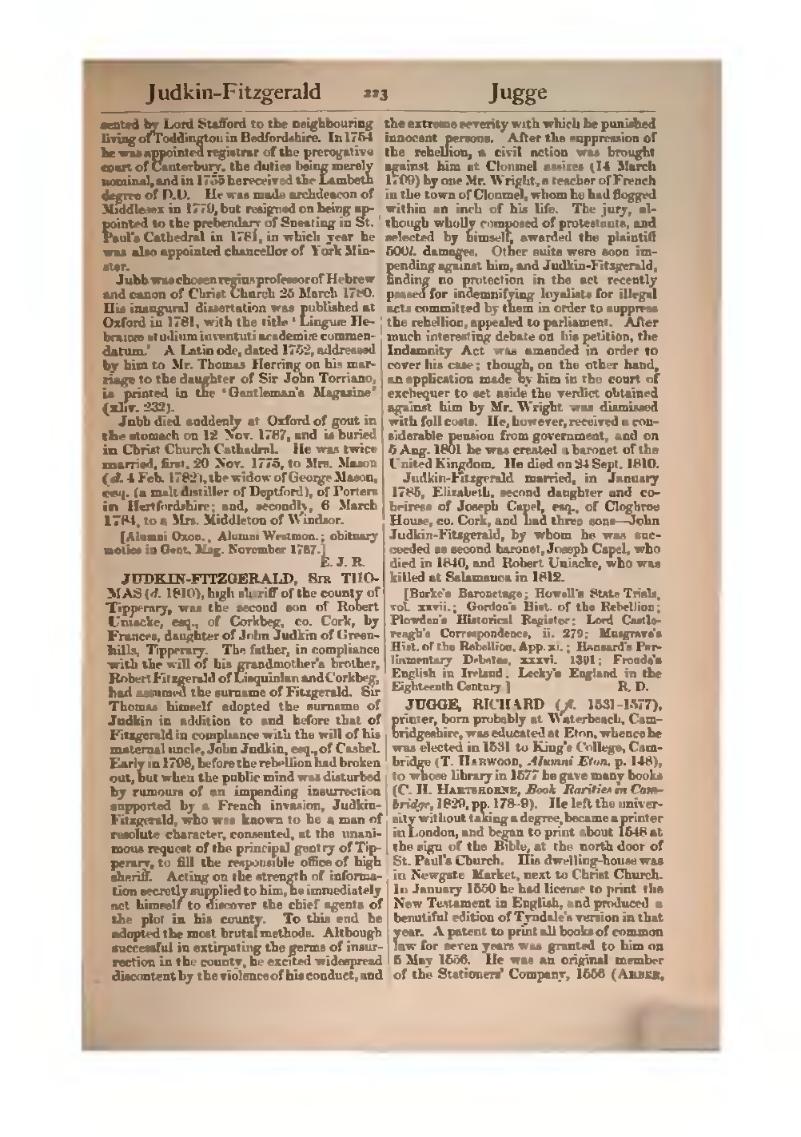sented by Lord Stafford to the neighbouring living of Toddington in Bedfordshire. In 1754 he was appointed registrar of the prerogative court of Canterbury, the duties being merely nominal, and in 1755 he received the Lambeth degree of D.D. He was made archdeacon of Middlesex in 1779, but resigned on being appointed to the prebend of Sneating in St. Paul's Cathedral in 1781, in which year he was also appointed chancellor of York Minster.
Jubb was chosen regius professor of Hebrew and canon of Christ Church 25 March 1780. His inaugural dissertation was published at Oxford in 1781, with the title ‘Linguæ Hebraicæ studium iuventuti academiæ commendatum.’ A Latin ode, dated 1752, addressed by him to Mr. Thomas Herring on his marriage to the daughter of Sir John Torriano, is printed in the ‘Gentleman's Magazine’ (xliv. 232).
Jubb died suddenly at Oxford of gout in the stomach on 12 Nov. 1787, and is buried in Christ Church Cathedral. He was twice married, first, 20 Nov. 1775, to Mrs. Mason (d. 4 Feb. 1782), the widow of George Mason, esq. (a malt distiller of Deptford), of Porters in Hertfordshire; and, secondly, 6 March 1784, to a Mrs. Middleton of Windsor.
[Alumni Oxon.; Alumni Westmon.; obituary notice in Gent. Mag. November 1787.]
JUDKIN-FITZGERALD, Sir THOMAS (d. 1810), high sheriff of the county of Tipperary, was the second son of Robert Uniacke, esq., of Corkbeg, co. Cork, by Frances, daughter of John Judkin of Greenhills, Tipperary. The father, in compliance with the will of his grandmother's brother, Robert Fitzgerald of Lisquinlan and Corkbeg, had assumed the surname of Fitzgerald. Sir Thomas himself adopted the surname of Judkin in addition to and before that of Fitzgerald in compliance with the will of his maternal uncle, John Judkin, esq., of Cashel. Early in 1798, before the rebellion had broken out, but when the public mind was disturbed by rumours of an impending insurrection supported by a French invasion, Judkin-Fitzgerald, who was known to be a man of resolute character, consented, at the unanimous request of the principal gentry of Tipperary, to fill the responsible office of high sheriff. Acting on the strength of information secretly supplied to him, he immediately set himself to discover the chief agents of the plot in his county. To this end he adopted the most brutal methods. Although successful in extirpating the germs of insurrection in the county, he excited widespread discontent by the violence of his conduct, and the extreme severity with which he punished innocent persons. After the suppression of the rebellion, a civil action was brought against him at Clonmel assizes (14 March 1799) by one Mr. Wright, a teacher of French in the town of Clonmel, whom he had flogged within an inch of his life. The jury, although wholly composed of protestants, and selected by himself, awarded the plaintiff 500l. damages. Other suits were soon impending against him, and Judkin-Fitzgerald, finding no protection in the act recently passed for indemnifying loyalists for illegal acts committed by them in order to suppress the rebellion, appealed to parliament. After much interesting debate on his petition, the Indemnity Act was amended in order to cover his case; though, on the other hand, an application made by him in the court of exchequer to set aside the verdict obtained against him by Mr. Wright was dismissed with full costs. He, however, received a considerable pension from government, and on 5 Aug. 1801 he was created a baronet of the United Kingdom. He died on 24 Sept. 1810.
Judkin-Fitzgerald married, in January 1785, Elizabeth, second daughter and coheiress of Joseph Capel, esq., of Cloghroe House, co. Cork, and had three sons—John Judkin-Fitzgerald, by whom he was succeeded as second baronet, Joseph Capel, who died in 1840, and Robert Uniacke, who was killed at Salamanca in 1812.
[Burke's Baronetage; Howell's State Trials, vol. xxvii.; Gordon's Hist. of the Rebellion; Plowden's Historical Register; Lord Castlereagh's Correspondence, ii. 279; Musgrave's Hist. of the Rebellion, App. xi.; Hansard's Parliamentary Debates, xxxvi. 1391; Froude's English in Ireland; Lecky's England in the Eighteenth Century.]
JUGGE, RICHARD (fl. 1531–1577), printer, born probably at Waterbeach, Cambridgeshire, was educated at Eton, whence he was elected in 1531 to King's College, Cambridge (T. Harwood, Alumni Eton. p. 148), to whose library in 1577 he gave many books (C. H. Hartshorne, Book Rarities in Cambridge, 1829, pp. 178–9). He left the university without taking a degree, became a printer in London, and began to print about 1548 at the sign of the Bible, at the north door of St. Paul's Church. His dwelling-house was in Newgate Market, next to Christ Church. In January 1550 he had license to print the New Testament in English, and produced a beautiful edition of Tyndale's version in that year. A patent to print all books of common law for seven years was granted to him on 5 May 1556. He was an original member of the Stationers' Company, 1556 (Arber,
